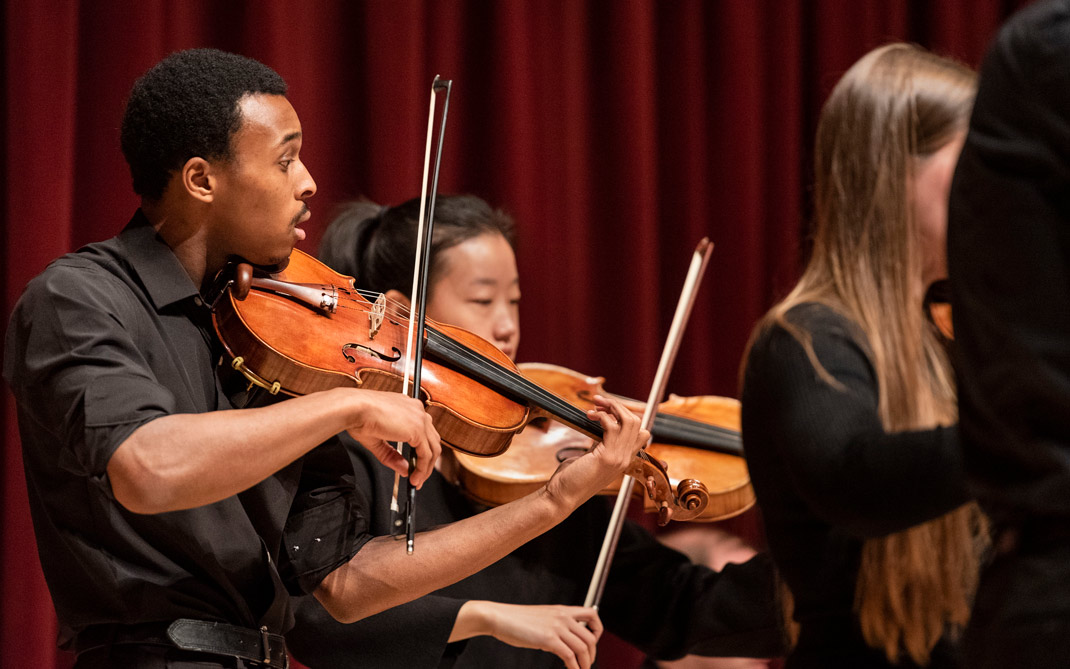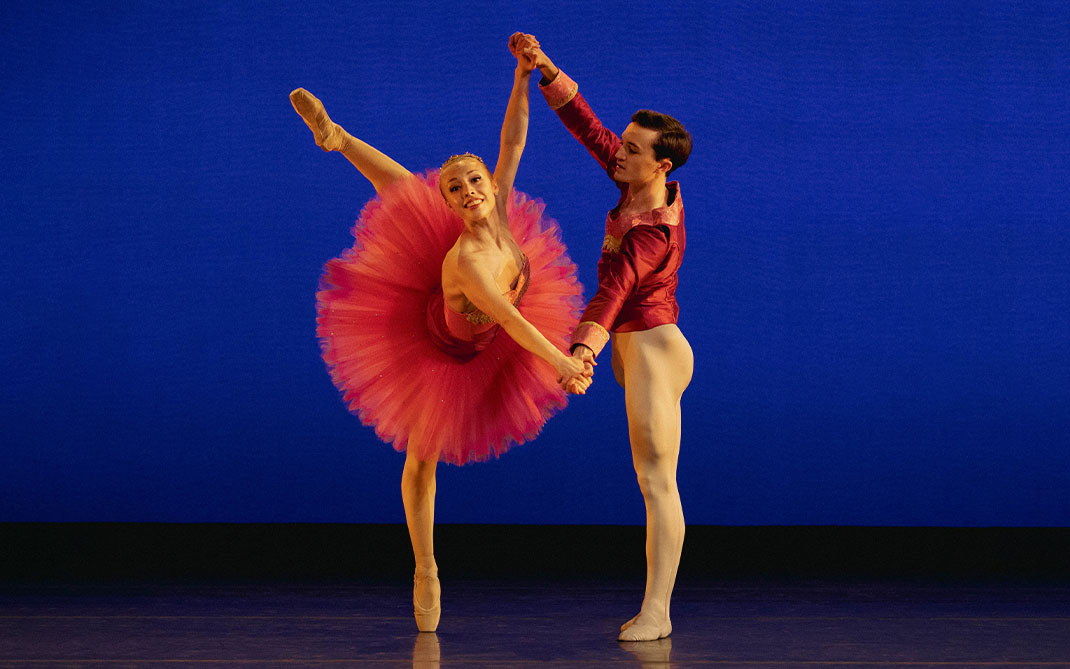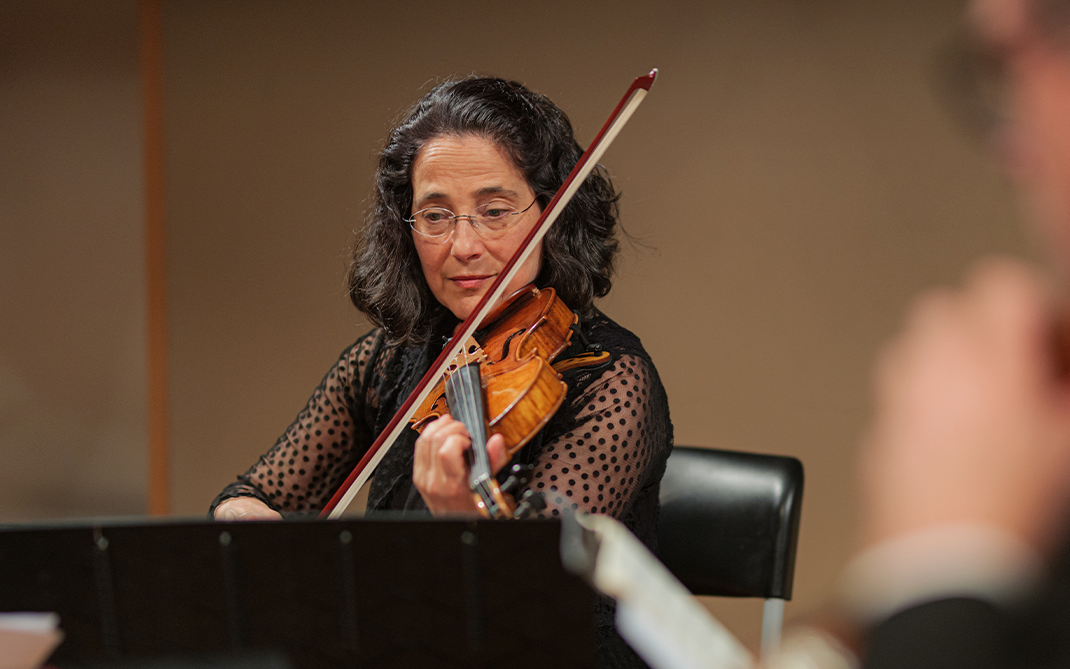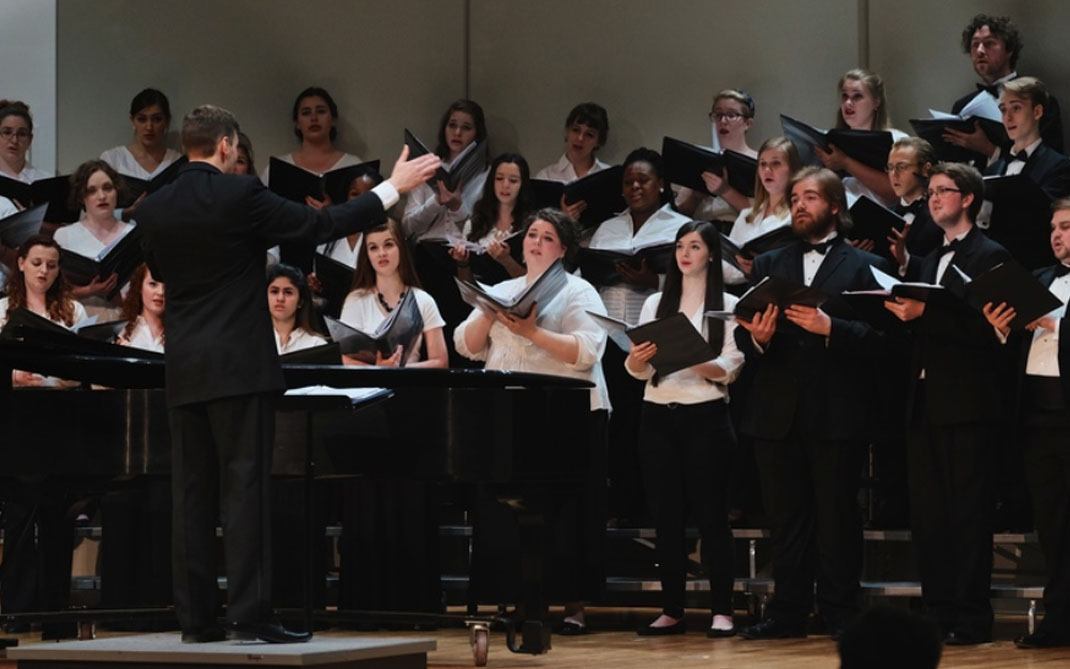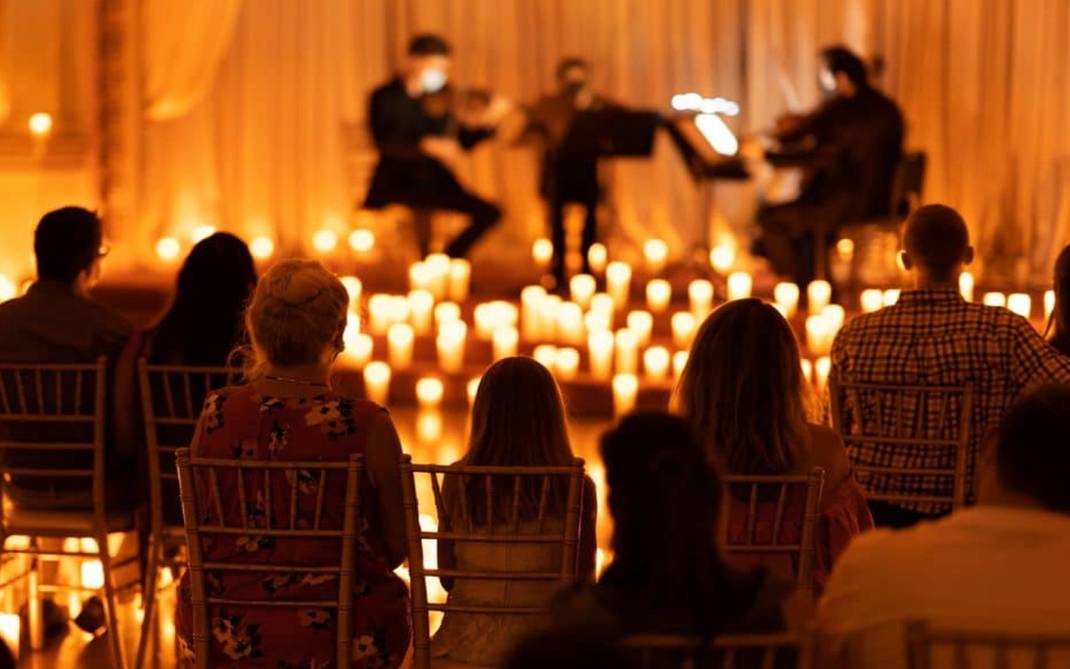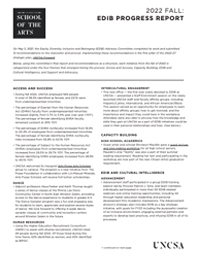2022 Fall EDIB Progress Report
On May 5, 2021, the Equity, Diversity, Inclusion and Belonging (EDIB) Advisory Committee completed its work and submitted 12 recommendations to the chancellor and provost. Implementing these recommendations is the first pillar of the 2022-27 strategic plan, UNCSA Forward.
Below, using the committee’s final report and recommendations as a structure, each initiative from the fall of 2022 is categorized under the four themes that emerged during the process: Access and Success, Capacity Building, EDIB and Cultural Intelligence, and Support and Advocacy.
On this page:
ACCESS AND SUCCESS
- During fall 2022, UNCSA employed 569 people. A total of 38.5% identified as female, and 23.1% were from underrepresented minorities.
- The percentage of Exempt from the Human Resources Act (EHRA) faculty from underrepresented minorities increased slightly, from 5.7% to 5.9% year over year (YOY). The percentage of female-identifying EHRA faculty remained constant at 39% YOY.
- The percentage of EHRA nonfaculty increased from 18.9% to 20.4% of employees from underrepresented minorities. The percentage of female-identifying EHRA nonfaculty roles increased from 56.8% to 62.1% YOY.
- The percentage of Subject to the Human Resources Act (SHRA) employees from underrepresented minorities increased from 29.5% to 29.7% YOY. The percentage of female-identifying SHRA employees increased from 48.9% to 49.1% YOY.
- UNCSA welcomed its inaugural Arts Posse Arts Scholars group to campus. The program is a new initiative from The Posse Foundation in collaboration with Lin-Manuel Miranda. Arts Posse Scholars will receive full-tuition scholarships.
Dance
- Adjunct professors Akua Parker and Keith Thomas taught a series of dance classes at the Minnie Lee Davis Community Center in North East Winston Salem, providing access to the dance experience to students in grades K-5. The Dance Sampler program was a fun and engaging way for students to learn, appreciate and explore several styles of dance. We look forward to offering 4-week dance sampler classes at community and recreation centers around Winston Salem in the future.
Human Resources:
- Using the Higher Education Recruitment Consortium (HERC) to assist with diverse recruitment, UNCSA hired 49 people during fall 2022. Of those hired during this time frame, 63% identified as women, and 45% identified as BIPOC.
Intercultural Engagement:
- This new office — the first ever solely devoted to EDIB at UNCSA — presented a Staff Enrichment session on the newly launched UNCSA staff and faculty affinity groups, including Hispanic/Latine, international, and African American/Black. This session served as an opportunity for employees to learn more about affinity groups, how to get involved, and the importance and impact they could have in the workplace. Attendees were also able to process how the knowledge and skills they gain at UNCSA as a part of EDIB initiatives could be used in their personal relationships and lives. (See below.)
CAPACITY BUILDING
High School Academics:
Guest artist and scholar Bronwyn Mauldin gave a guest lecture and zine-making workshop for all high school seniors. Mauldin’s zine "Testify" was also a part of their summer
reading requirement. Reading her text and participating in the workshop are now part
of the new Citizen Artist graduation requirement.
EDIB AND CULTURAL INTELLIGENCE
Advancement:
Advancement staff participated in a group EDIB training session led by Provost Patrick J. Sims, and team members individually participated in more than 50 EDIB-related webinars and online training opportunities, including 44 through higher education leadership and personal development firm Academic Impressions. The Advancement division's strategic plan includes EDIB as a key strategic initiative, with goals for FY23 including the purposeful creation of an inclusive environment, engaging external partners and experts to develop best practices, and infusing EDIB in all of its processes.
Dance:
Dean Endalyn T. Outlaw hosted a conversation with acclaimed American Ballet Theatre principal dancer Misty Copeland to give students the opportunity to hear about Copeland's commitment to EDIB work and diligence in providing access and opportunity for diverse populations in the field of ballet. Topics discussed included EDIB in ballet, accessibility, community engagement and Copeland’s books.
Intercultural Engagement:
- High School Life sponsored an outing, including free tickets and transportation, to Black Violin’s “Give Thanks Tour.” Black Violin is a highly acclaimed duo of African American musicians who combine their classically trained skills with American hip-hop music stylings. This event increased exposure to how professional instrumentalists can showcase their cultural expression while being in an underrepresented art form.
- With assistance from the Office of the Provost, this new office launched staff and faculty affinity groups, which are university-supported and -facilitated groups formed around identities. Through participation in affinity groups, UNCSA staff and faculty help foster a positive work environment by actively contributing to the institution’s mission; values; and efforts specific to equity, diversity, inclusion and belonging.
- More than 100 staff, faculty, and administration were invited to participate in “Black Panther: Wakanda Forever” screenings. Preparation for the screening included information about the impact of the movie featuring pre-Columbian American culture, specifically ancient Aztec culture, as significant as a broadening of the way Native Americans and Indigenous cultures are envisioned in a blockbuster film.
Thomas S. Kenan Institute for the Arts:
- The Kenan Institute’s Art Restart podcast explores how creatives around the world are reinventing their fields and building a new landscape for the arts. Central to this program is the artistic visibility of artists of color, women, LGBTQ+ and other historically underrepresented groups. Fall semester guests included UNCSA alumni Ayo Janeen Jackson and Trey McIntyre; Southeast-based artist Sekou Cooke; and nationally recognized artists Shedrick Pelt, Midori Samson, Cedric Mitchell, and siblings Crystal and Rico Worl.
- As part of an ongoing effort to increase global connectivity and encourage the creation of culturally responsive curriculum at UNCSA, the Kenan Institute supported multiple projects and residencies led by international and BIPOC artists during fall 2023. More than 80 students in the UNCSA High School, School of Drama, and Division of Liberal Arts participated in a three-day residency with “The Frontera Project,” an interactive, bilingual theater experience about life at the U.S./Mexico border. In partnership with the Hispanic League of Winston-Salem, the project included workshops exploring devised theater and an interactive, bilingual public performance at Milton Rhodes Center for the Arts.
- In addition, the institute cosponsored international guest artist Patricia Caicedo’s residency with the UNCSA School of Music, where she presented lectures on her research of Spanish, Portuguese and Latin American art song and music and social health. A soprano and well-known musicologist, she is also the founder of the Barcelona Festival of Song and a recently published author of the book “We are what we listen to: The impact of music on individual and social health.” More than 150 students attended a recital and three lectures on several topics related to EDIB, diversification of student repertoire, and arts & wellness.
-
In August 2022, the Kenan Institute hosted the book launch of "Holy Ground: The National Black Theatre Festival Anthology" during the 17th biennial National Black Theatre Festival (NBTF). Recognized as one of the most historic and culturally significant events not only in the history of Black theater but in American theater, the NBTF has been a fixture in Winston-Salem since its founding in 1989 by Larry Leon Hamlin. Published by Theatre Communications Group and edited by New York University professor Michael D. Dinwiddie, the book celebrates the first 30 years of the festival through a new collection of three full-length plays produced at the festival, along with 17 monologues and scenes selected from each year of the festival, featuring the artists and playwrights Jackie Alexander, Ifa Bayeza, Pearl Cleage, Kamilah Forbes, Endesha Ida Mae Holland, Javon Johnson, Rhodessa Jones, and others.The Kenan Institute for the Arts is a proud sponsor of the book, which features a preface by Maya Angelou.
Design & Production:
- Last fall, the school changed the scope of its Intro to Theater Production class, which is required for all first-year D&P students. Each rotation focuses on a play by and about BIPOC artists and stories. Students learn how to tell the story, represent the culture, and make primary resource choices so the actors see themselves in all stages of the work. The D&P students learn what is appropriate to pull for visuals and where to find them. Students research what the playwright was thinking when the work was written and identify their personal biases so they can lead with a pure direction for the BIPOC talent to tell the story.
SUPPORT AND ADVOCACY
Drama:
- The School of Drama has been highly intentional about diverse casting and fall 2022 shows were no different. Both “Sweeney Todd” and “Amadeus” emphasized opening casting opportunities to actors of many different backgrounds. Both productions were set in Europe; however, three of the four leads in “Sweeney Todd” were BIPOC, and all leads in “Amadeus” were BIPOC. In addition, Venezuelan alum Lo Feliciani Ojeda, director of “Sweeney Todd,” identifies as queer, nonbinary and BIPOC.
Intercultural Engagement:
- Shawn Parker, a licensed mental health counselor, continues to facilitate a bimonthly mental health affinity group with male students of color as an intervention designed to utilize mental health providers with personal experiences based on shared racial/ethnic and gender identities.
- The offices of Intercultural Engagement and Residence Life collaborated to celebrate National Coming Out Day on Oct. 11 in Artist Village. This program offered an opportunity for students and staff to gather, support and fellowship in an environment created to celebrate the LGBTQIA+ community. Takeaways included an informational handbill that explained the differences between sex, gender identity, gender expression, and sexual orientation, as well as an infographic of the various Pride flags used within the LGBTQIA+ community. Within High School Life, National Coming Out Day was celebrated through programming by Spectrum, the LGBT student organization.
- With support from the Office of Intercultural Engagement, Artists of Color presented a monthlong series of programming for Hispanic Heritage Month, including a Pan Y Café (a coffee and bread social); a screening talk-back of the film “In the Heights” in ACE Exhibition Complex; an event offering cultural expression and showcasing the diversity within the Latine community; and a party featuring music, dancing and a Latin food truck.
- With support from the offices of Intercultural Engagement and Student Engagement, a group of students hosted the first Diwali celebration on campus. The holiday is celebrated as a cultural festival in India and a religious observation of those practicing Hinduism. During the event, attendees learned about how Diwali is celebrated worldwide through a video presentation and a program containing the traditional prayer and the story of Diwali. The event also entailed an authentic prayer ceremony, traditional Indian food and sparklers.
- The associate provost/dean of student affairs and the director of intercultural engagement held a listening session with international students over a catered lunch. During this session, the students shared their experiences and concerns about being international students at UNCSA. From this meeting, a list of commitments to better support international students was developed. These included hiring another professional for the Office of Intercultural Engagement to serve as an international adviser; developing a manual and flowchart to clearly outline the responsibilities of various offices and roles within the university in relation to international students; and maximizing the UNCSA network to bring experts to campus to assist with navigating local, state and federal policies and regulations, such as Social Security, driver licenses and filing taxes.
Music:
- The majority of guests engaged by the School of Music during the fall of 2022 again were BIPOC, female-identifying, and LGBTQIA+ musicians and composers. These included the following:
- Internationally acclaimed soprano Latonia Moore, recently seen as Billie in “Fire Shut Up in My Bones” and as Serena in “Porgy & Bess” at The Metropolitan Opera, presented a recital at UNCSA and worked with School of Music voice students in master classes inSeptember.
- Hailed by Herbie Hancock as “a new voice in the further development of jazz in the future,” educator, arranger and award-winning composer Omar Thomas visited UNCSA for an extended residency with the School of Music. He worked with student composers and instrumentalists, focusing on his work with Black American music. The residency culminated with a performance of his compositions by the UNCSA Wind Ensemble.
- Flutist Jennifer Grim, professor at the University of Miami, visited UNCSA in December for a series of classes and performances highlighting her latest album, “Through Broken Time,” a collection of works at the intersection of Afro-Modernism and post-minimalism. She taught a class on the music of Valerie Coleman and gave a lecture entitled "The Art of Programming Within the EDIB Framework."
- Mexican-American bass-baritone Richard Ollarsaba, a UNCSA alumnus who has appeared with Lyric Opera of Chicago, Minnesota Opera, New Zealand Opera, Chicago Opera Theater, and the Glimmerglass Festival, and was a grand finalist in The Metropolitan Opera National Council Auditions, performed a recital at UNCSA in the fall. His recital program brought his background in American song and his Mexican heritage together, highlighting the rich diversity and similarities between the song traditions of the USA and Mexico.
- The School of Music choir performed the work "Song for Snow" by Florence Price, the first Black woman to have her work performed by a major American symphony orchestra. This was the world premiere performance of the piece in a new orchestration by School of Music faculty member James Allbritten.
Trustees:
- The Board of Trustees continues to strive for a diverse board, recruiting members from various backgrounds. This diversity is inclusive of race, ethnicity, cultural identity, professional industry, gender, age, LGTBQI+ representation, etc. A significant focus of the spring board retreat will be ways the board can continue to diversify the board so that it is representative of the UNCSA campus community.
October 25, 2023
